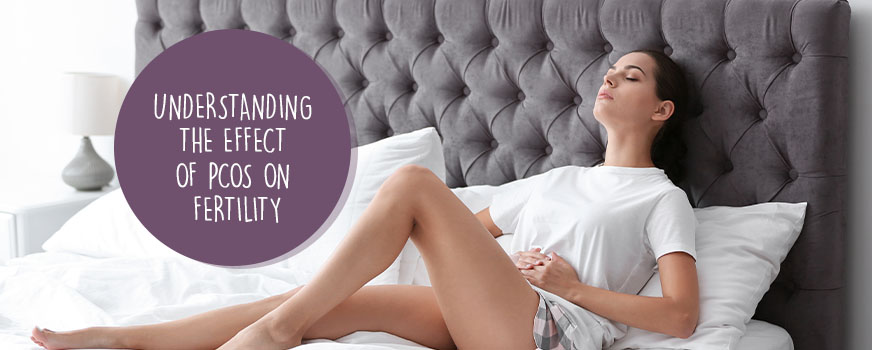
Polycystic ovarian syndrome, or PCOS, is one of the most common endocrine disorders of reproductive age women. It affects 4-12% of women in the United States. With a variety of information about PCOS and fertility myths to steer you askew, it’s important to learn about the condition and the ways that it might affect you. Whether you’re a woman with PCOS or not, learn more about this endocrine disorder and how it may affect your fertility journey.
Understanding PCOS: Symptoms and Treatment
Polycystic ovarian syndrome (PCOS) is a set of symptoms related to hormonal imbalances affecting women of reproductive age. Women with PCOS may experience the following conditions:
- Skin changes such as increase facial and body hair and acne, due to high levels of androgens (a type of hormone)
- Cysts in the ovaries
- Absence of ovulation, leading to irregular menstrual periods or no periods at all
- Infertility
PCOS may present itself differently in different women. Most women diagnosed with PCOS experience irregular periods and an increase in androgen, but cysts do not present themselves in all cases. Early diagnosis and treatment can reduce the risk of long-term complications that come along with PCOS and understand your individual effects of PCOS on fertility.
Causes of PCOS
Unfortunately, the exact causes of PCOS are unknown, but certain factors that doctors believe play a role include excess insulin, low-grade inflammation, heredity, excess androgen. Read more about potential causes here. There is no single test to show whether or not you have PCOS, rather it is diagnosed if you experience two out of the three primary causes of PCOS.

Long-Term Effects of PCOS
PCOS can put women at higher risk for developing the following:
- Sleep apnea
- Insulin resistance
- Type 2 diabetes
- Metabolic syndrome
- Obesity
- Heart disease and high blood pressure
- Mood disorders
- Endometrial hyperplasia
Due to the severity of the potential long-term effects, it’s extremely important to contact your healthcare professional if you believe that you may be experiencing symptoms of PCOS. Your doctor can help you decide on a treatment plan that is right for you and your PCOS and fertility journey.
Treatment and Solutions for PCOS
Luckily, there are ways to treat the symptoms of PCOS that depend on your individual concerns such as infertility, acne, hair growth, and obesity. Depending on your case, your specific treatment plan will differ from woman to woman, as PCOS is not the same across the board. Most treatments for PCOS include lifestyle changes, such as weight loss to maintain a healthy weight, moderate exercise to stay active, and a general commitment to a healthy lifestyle. Studies have shown that even moderate weight loss can drastically improve PCOS and fertility for many women.
Doctors may also prescribe certain medications depending on the severity of your condition and the goals you wish to achieve through treatment. For regulating your menstrual cycle, your doctor might recommend combination birth control pills or progestin therapy. To help with ovulation, doctors can recommend a number of medications that can stimulate the ovulation process. Different medications can treat different aspects of the symptoms of PCOS.
Many of these treatments have proven effective for women with PCOS in achieving their treatment goals, but remember to always consult your health care professional about your PCOS and fertility goals.

PCOS and Fertility
PCOS is one of the most common causes of anovulatory infertility. This means that infertility results from a lack of ovulation, which is a common symptom of PCOS. In fact, many women don’t find out they have PCOS until they are having trouble conceiving. Different women experience the symptoms of PCOS in different ways, especially in regard to fertility. Not all women with PCOS experience difficulty when trying to conceive, but others do. You shouldn’t assume that you have fertility issues just because you have PCOS, as this isn’t true across the board.
Additionally, there are treatments that can often help increase your chances of ovulating and conceiving. It’s important to note that as you get older, your fertility decreases, so if you have PCOS and you want to get pregnant, you should consult with your doctor about when it is best to start trying.
Take Care of Your Fertility
Every fertility journey is unique, and some come with different and sometimes larger obstacles than others. But remember, that there are always options and ways to achieve your goal of starting a family. If you are a woman with PCOS, then you know that fertility is not out of the question for you. With the right treatments and support of a doctor, it is most definitely possible to become pregnant. Find out what the best time is to turn to a fertility specialist.
Remember that above all, your health is what matters. Rely on the support around you and consider the benefits of having a fertility coach during your fertility journey. They will be there every step of the way with you. PCOS does not have to be an obstacle to fertility for every woman. Discover the possibilities in your PCOS and fertility journey with Red Rock Fertility Clinic.



